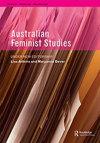Commodity Feminism and Dressing the ‘Best Self’ on A Practical Wedding
IF 1.5
4区 社会学
Q2 WOMENS STUDIES
引用次数: 4
Abstract
ABSTRACT Fashion as a cultural industry, with its interface between self and social, is laden with potential for interventions in systems of power. Yet its changemaking potential is susceptible to co-optation by neoliberal discourses that harness politics with a commodified, perfectible individuality that superficially counteracts hegemony even as it subtly reinforces it. So much is evident in nominally feminist wedding website A Practical Wedding, which provides an alternative media space for people who are marginalized by or politically opposed to the politics and commercial logics of the mainstream wedding industry. While many of its posts critique the ‘wedding industrial complex’ and provide meaningful spaces for queer and feminist people to discuss and plan their weddings, the posts relating to fashion and dress are largely emptied of feminist politics. While these posts gesture towards inclusivity and resistance, by harnessing these messages to commodity feminism and neoliberal concepts of self-perfection, these posts ultimately reinforce the heteropatriarchal messages in the industry that APW is ostensibly trying to resist. This article asks: what is at stake in the blog’s excision of fashion from politics? What insights does this cleavage between apparel and the feminist political scene offer for scholars of feminism’s digital ecosystem?商品女权主义和在实际婚礼上穿“最好的自己”
时尚作为一种文化产业,具有自我与社会之间的界面,充满了干预权力体系的潜力。然而,它的变革潜力很容易受到新自由主义话语的影响,这些话语利用商品化的、完美的个性来驾驭政治,表面上抵消霸权,甚至微妙地加强霸权。名义上是女权主义的婚礼网站“实用婚礼”,为那些被主流婚礼行业的政治和商业逻辑边缘化或在政治上反对的人提供了另一个媒体空间。虽然它的许多帖子批评了“婚礼工业综合体”,并为酷儿和女权主义者提供了有意义的空间来讨论和计划他们的婚礼,但与时尚和服装有关的帖子基本上没有女权主义政治。虽然这些帖子表明了包容性和抵抗性,通过利用这些信息来实现商品女权主义和自我完善的新自由主义概念,这些帖子最终强化了APW表面上试图抵制的行业内的异性恋信息。这篇文章提出了一个问题:博客将时尚从政治中剔除的做法有什么利害关系?服装和女权主义政治场景之间的这种分裂为女权主义数字生态系统的学者提供了什么见解?
本文章由计算机程序翻译,如有差异,请以英文原文为准。
求助全文
约1分钟内获得全文
求助全文
来源期刊

Australian Feminist Studies
WOMENS STUDIES-
CiteScore
2.50
自引率
0.00%
发文量
7
期刊介绍:
Australian Feminist Studies was launched in the summer of 1985 by the Research Centre for Women"s Studies at the University of Adelaide. During the subsequent two decades it has become a leading journal of feminist studies. As an international, peer-reviewed journal, Australian Feminist Studies is proud to sustain a clear political commitment to feminist teaching, research and scholarship. The journal publishes articles of the highest calibre from all around the world, that contribute to current developments and issues across a spectrum of feminisms.
 求助内容:
求助内容: 应助结果提醒方式:
应助结果提醒方式:


